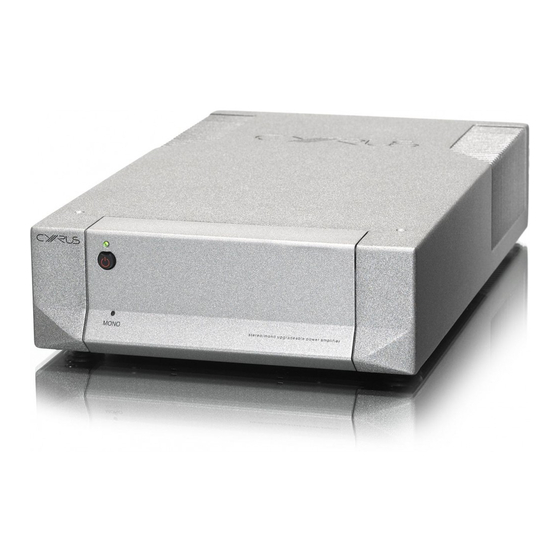
User Instructions
Welcome to the world of Cyrus!
Congratulations on your choice of Cyrus Hi-fi products. Our state-of-the-art
design technology and outstanding quality of manufacture has won countless
awards around the world. We are confident that you will derive great
pleasure from owning a product from one of the most recognised and
respected manufacturers of hi-fi equipment.
Please read these instructions carefully before commencing installation. They
provide full guidance to help you install your Cyrus 6 Power, 8 Power or X
Power safely and correctly.
Cyrus 6 Power, 8 Power & X Power model differences
These user instructions refer to the Cyrus 6 Power, Cyrus 8 Power and Cyrus
X Power amplifiers. Model differences are indicated in the text where they
occur.
Preparations for Installation
Before installing the Cyrus 6/8/X Power check that the following items are
included in the accessory box.
•
Guarantee Card (back page of instruction manual)
•
Power Cable
•
2 MC-Bus phono cables
•
4 speaker plugs (certain markets only)
After removing these items, please retain the packing.
Install the Cyrus6/8/X Power in a well ventilated location away from sources
of high temperature, dust or humidity. Never stand the 6/8/X Power under
another unit or on any surface likely to hamper its cooling or ventilation.
GB
GB
Cyrus 6 Power, 8 Power & X Power
INSTALLATION - 6 Power
Key to the 6 Power rear panel drawing (Fig.1b)
1. Right speaker output +
2. Right speaker output -
3. MC-Bus Connection
4
Right Chain Output
5. Left Chain Output
6. Left Input
7. Right Input
Connecting to the AC Mains Supply
Connect the socket on the AC Power cable to the Power inlet
of the 6 Power. Now connect the cable to a suitable AC power point.
1$
The mains power switch
on the rear panel of the 6 Power should be left on
for normal operation, except when left unattended for a long period when it
should be switched off or disconnected from the AC supply.
Input Connection
Connect a stereo phono interconnect from the output of the preamplifier to the
f
6 Power's left and right inputs
plugs to keep left and right channels correctly ordered.
Loudspeaker Connection
Fitting the speaker plugs
Check for polarity indicators (+ and -) on the loudspeaker cable and fit the
plugs provided. Observe any signal directionality markings indicated on the
cable. If an arrow is printed on the cable it should point toward the
loudspeaker. If additional or replacement speaker plugs are required for the 6
Power ensure that the correct 'BFA' type are purchased.
Loudspeaker connection
Connect the left loudspeaker to the rear panel sockets
i
and
(black speaker plug) of the 6 Power. Connect the right loudspeaker to
a
the rear panel sockets
(red speaker plug) and
the 6 Power.
Dual outputs are provided for the convenient connection of bi-wiring speaker
cables. Fig. 4a shows a wiring schematic for a bi-wired system.
Bi-amplification
For convenience of connection in applications such as Bi-Amplification the
,
d
e
Chain outputs
allow more than one 6 Power to be connected to a Pre-
Amplifier.
The Chain facility can be used with two or more 6 Powers for Bi/Tri-amping by
connecting the Chain output of the first 6 Power to the inputs of the next 6
Power. Such a system provides the sonic benefits of totally separate power
amplification for the bass and treble units of the loudspeakers.
When adding additional 6 Powers to a system, connect a quality RCA phono
interconnect from the Chain output RCA jacks
the new 6 Power.
When the input connections to the new amplifier are complete, separate
connections may be made to the bass and treble units of the system
speakers. Fig. 4c shows a wiring schematic for a bi-amped system.
MC-Bus connection
Connecting the MC-BUS sockets
provides unified system power control. An MC-BUS loop is established by
connecting single phono cables from the MC-BUS output of one unit to the
MC-BUS input of another in a daisy-chain. Complete the loop by returning the
MC-BUS output of the final component to the MC-BUS input of the first (see
example system connections in Fig. 3).
With MC-BUS established you can control the power function of the system
from the front panel or remote control of the main Cyrus amplifier or Surround
Processor.
8. -
9. Left speaker output -
10. Left speaker output +
11. -
12. Power Inlet
13. Mains Fuse
14. Power Switch
1@
on the rear panel
,
g
. Be sure to observe colour coding of the
1)
(red speaker plug)
b
(black speaker plug) of
,
d
e
to the inputs
c
of the 6 Power in an MC-BUS system
,
f
g
of
3
